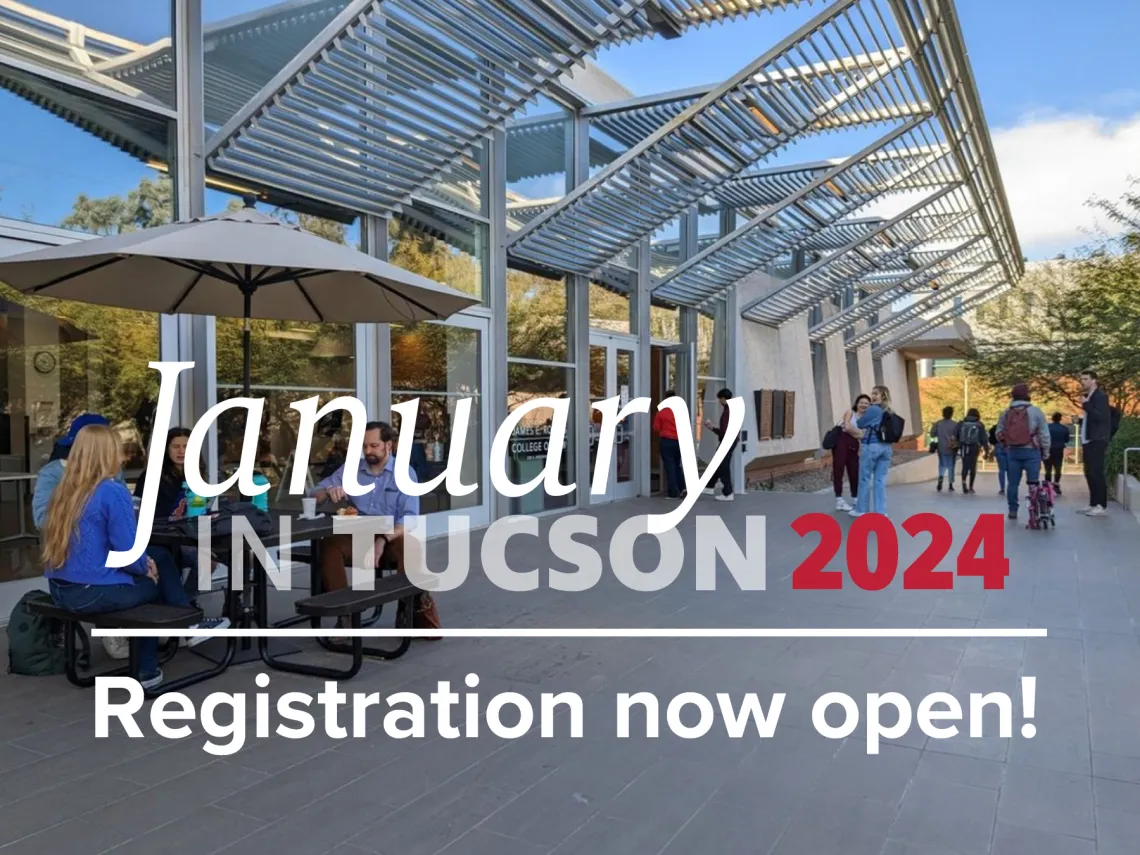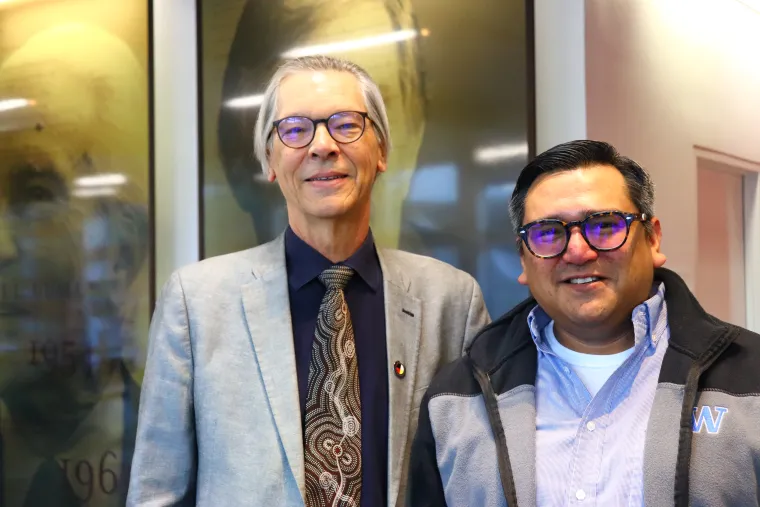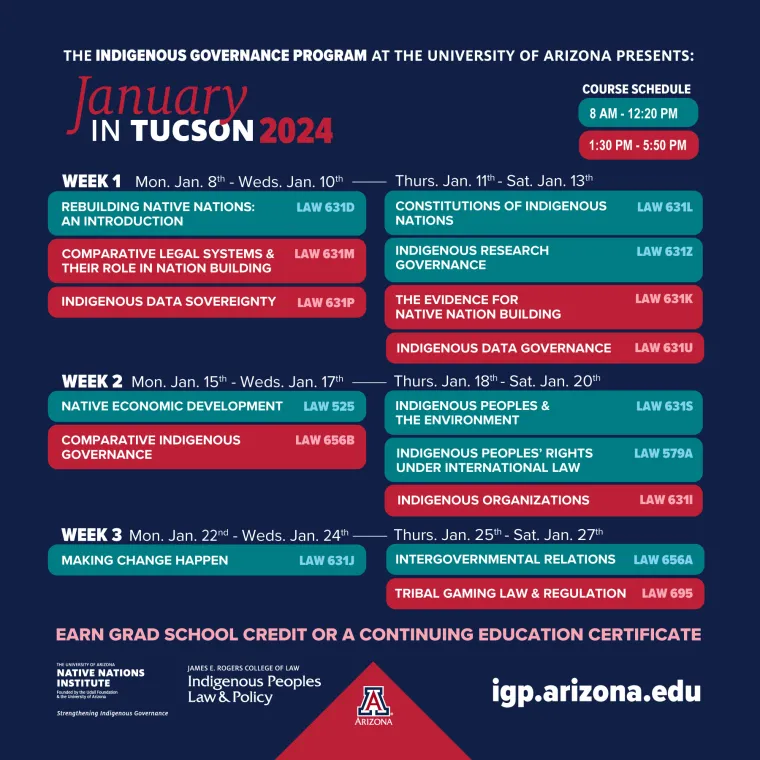Registration Open for 2024 January in Tucson Accelerated Indigenous Governance Courses
15 popular and in-demand accelerated Indigenous governance courses are slated to run in 2024 following the most well-attended year of the flagship education event for UArizona’s Indigenous Governance Program.

Courtesy James E. Rogers College of Law
January in Tucson (JIT) – the flagship accelerated educational event for UArizona’s Indigenous Governance Program (IGP) – is back for 2024 with established experts and a few fresh faces offering up some of the most in-demand courses on Indigenous governance and sovereignty in a compressed format and peer-driven learning environment unlike any other.
Each year since 2012, students, Tribal professionals, elected leaders, government officials, Indigenous community members and allies from around the world have converged on the UArizona campus in southern Arizona – where the average daily high temperature is a balmy 68 degrees Fahrenheit during the program – for three weeks of masters-level learning from top experts in the field.
IGP Manager Torivio Fodder (Taos Pueblo) doesn’t mince words when it comes to the quality of the educational experience at the annual event.
“Our faculty literally wrote the book on Indigenous governance,” Fodder says, adding that “Participants will be learning from the best of the best, making our program second to none.”
Fodder is also an instructor of the JIT course ‘Indigenous Peoples and the Environment.’
Structure, Credits and Credentials

UArizona Law Professor Robert William, Jr. (Lumbee Tribe of North Carolina; left) and Indigenous Governance Program Manager Tory Fodder (Taos Pueblo) pose in the law school lobby on opening day of JIT 2023.
The three-week JIT experience will run between January 8 - January 27, 2024. Each of the 15 courses offered will take place as four-hour sessions delivered over the course of three consecutive days.
UArizona graduate students can earn one graduate academic credit for each course taken with the opportunity to earn as many as 12 graduate credits during the month (yes, that’s an entire semester’s worth of learning in just three weeks!).
The JIT curriculum also counts as required coursework for the Master of Professional Studies in Indigenous Governance, a first-of-its-kind graduate degree focused on IGP’s Native nation building curriculum.
For non-students looking to attend as a matter of professional or personal development, the IGP also offers a Continuing Education Certificate for anyone taking at least six JIT courses (these don’t have to all be completed in the same year) and up to 12 Continuing Legal Education Credits (CLE) for each course taught by and taken by professional attorneys.
Community members are also invited to attend courses without pursuing any sort of credit or credential from the program if they would like to do so.
Unparalleled Peer Experience
A common refrain among JIT participants is that the experience of learning in the small, discussion-focused classes with like-minded and similarly driven peers is just as valuable as having access to the world-class intellectuals teaching those courses.
Melissa Tso (Diné/Navajo) is a social worker and was a member of the Native Nations Institute’s (NNI) 2020 Tribal Professional Cohort. She attended several JIT courses as part of her participation in that program.
“JIT participants should expect to come here to learn a lot from their instructors as well as their classmates,” says Tso. She says that JIT classes are attended by a variety of tribal professionals from a wide range of fields and Indigenous communities around the world. This, she says, allows everyone present to “collaborate across our different work spaces and even across different communities to share ideas… We are here for a common purpose, which is to better serve Indigenous communities.”
IGP Manager Torivio Fodder echoes this sentiment. “JIT draws an audience from all corners of the globe,” Fodder says. “Our participants are elected tribal leaders, working tribal professionals, folks from the non-profit and private sectors, individuals from government at every level, and UArizona Graduate students.”
This diversity of attendees lends itself to lively and productive group discussions about real challenges facing Indigenous communities today that include a level of actionable problem solving you just can’t get from a traditional academic course.
“There is no substitute for having conversations with another individual who is dealing with or who has dealt with a problem that might be very similar to the challenges being faced in one’s home community,” Fodder says, adding, “JIT creates the space for these meaningful conversations to happen.”
JIT 2024

The upcoming JIT program comes on the heels of the most well-attended iteration of the event in IGP history and promises to build on that success with a refreshed curriculum and the addition of a few new faces to the faculty lineup.
In addition to the return of long-time favorites like NNI Co-Founder Stephen Cornell, NNI Research Director Miriam Jorgensen and former Acting Assistant Secretary for Indian Affairs at the U.S. Department of the Interior Del Laverdure (Crow Nation), the 2024 JIT faculty will see the return of National Indian Gaming Commissioner, Phoenix Region Director Francisco Olea (Pascua Yaqui Tribe); and the addition of academic stars like the powerhouse mother-daughter instructor team of practicing partner, attorney Akilah Kinnison and Regents’ Professor Emerita at Georgia State University Natsu Taylor Saito.
The full course schedule and faculty lineup for JIT 2024 are available to view online and registration is now open for all courses.
Seating is limited, however, as class sizes are deliberately kept small to maximize the engagement and learning opportunities for all JIT attendees, so anyone interested in attending is encouraged to sign up early.
The IGP is managed in partnership between NNI and the Indigenous Peoples’ Law & Policy Program at the James E. Rogers College of Law.
Learn more about JIT 2024 and register for courses here.

